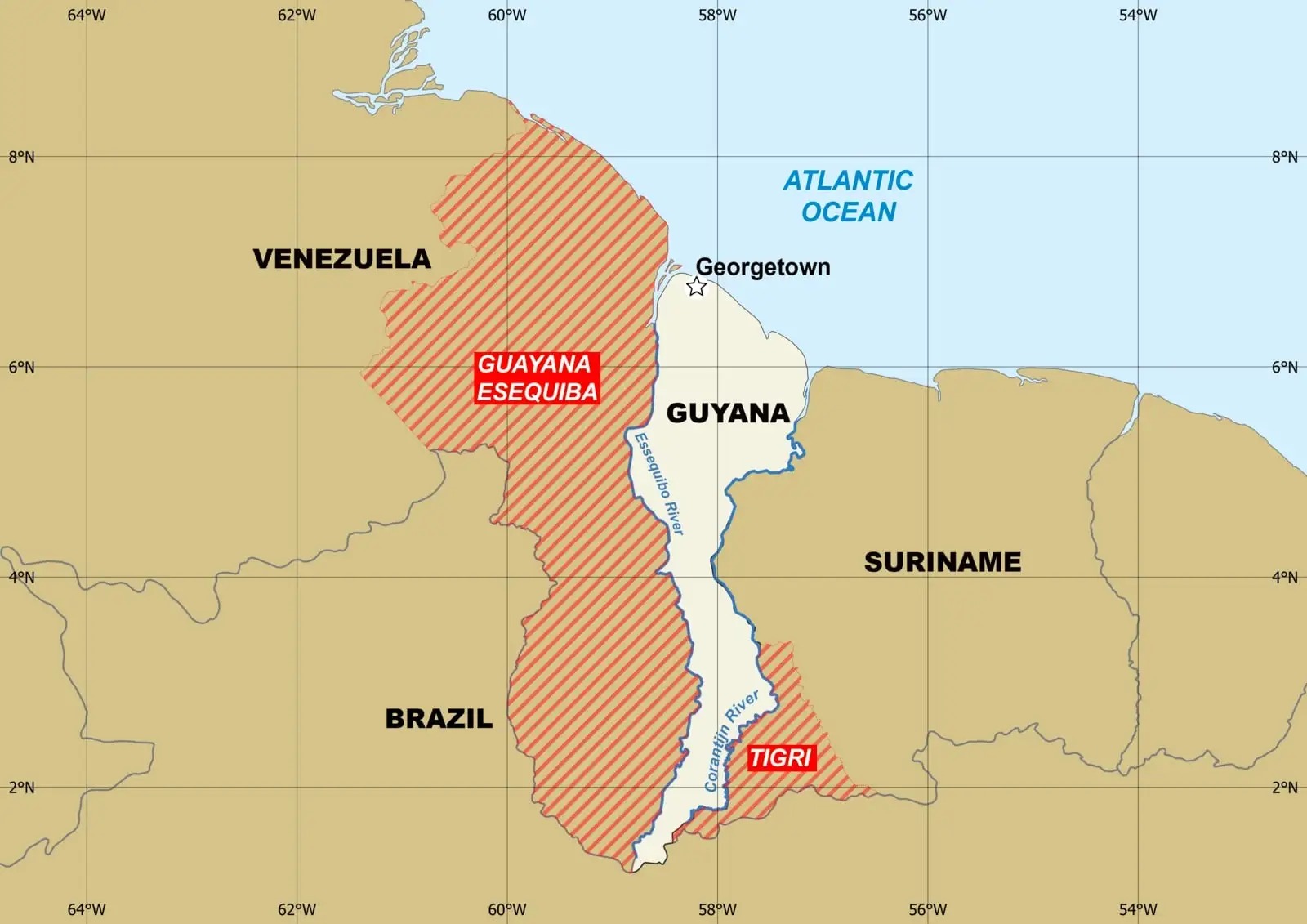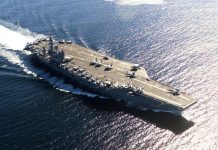The President of Venezuela, Nicolas Maduro, said in a live broadcast on April 3 that the United States has established secret bases in the resource-rich region of Essequibo, a territory that is governed by Guyana and fiercely claimed by Venezuela.
Inspired By ‘Narco Submarines,’ US Marines Test Semi-Submersibles To Counter China’s Numerical Edge
“We have confirmation that secret bases of the [United States] Southern Command and the CIA have been installed in the Guyana Essequibo region to prepare attacks on the population of southern and eastern Venezuela,” Maduro said. He was speaking at the promulgation of the Organic Law for the Defense of Guyana Essequibo, which unilaterally recognizes the region as part of Venezuela defying Guyana’s authority.
In essence, Venezuelan President Nicolás Maduro has passed a law to create a new Venezuelan state around the oil-rich region of Essequibo in neighboring Guyana, which has been lamented as illegal by Guyana. Guyana President Irrfan Ali said it was an attempt at annexing two-thirds of his country’s territory.
In fact, Maduro made these remarks four months after a contentious, non-binding referendum overwhelmingly approved the creation of a Venezuelan province in the disputed region, raising concerns about a military conflict.
The Venezuelan President reprimanded the United States by claiming that the bases were constructed “to prepare for an escalation against Venezuela.” He warned that these bases are tantamount to an “aggression” against the people of southern and eastern Venezuela.
This most recent attempt by Venezuela to annex more than two-thirds of Guyana’s sovereign territory and make it part of Venezuela is an egregious violation of the most fundamental principles of international law enshrined in the @UN Charter, the Charter of the Organisation of…
— President Dr Irfaan Ali (@presidentaligy) April 4, 2024
Maduro further claimed that ExxonMobil, the US Southern Command, and the CIA controlled Guyana instead of Irfaan Ali, the country’s lawful president. “We should always be ready to protect peace and Venezuela’s territorial integrity,” he stated with conviction.
The Southern Command of the US Department of Defense oversees a US Security Cooperation Office located in Guyana. This office provides military training and support to the Guyana Defense Force and serves as a military consultant by planning “security cooperation engagement activities.”
🇻🇪/🇬🇾🇺🇲 Venezuela says US building ‘secret’ bases in disputed Essequibo
Venezuelan President Nicolas Maduro on Wednesday accused the United States of building “secret military bases” in Essequibo, an oil-rich region of Guyana that Caracas claims as its territory.
“We have… pic.twitter.com/1e0GnSiJcG
— dana (@dana916) April 4, 2024
Maduro’s accusations come months after Guyana’s Attorney General Anil Nandlall said in January that Guyana’s government assured Venezuela that there were no formal requests or plans for the United States to establish a military facility in the South American country.
At the time, the Attorney General told the Associated Press that Venezuelan President Nicolás Maduro continued to be “convinced that Guyana could host” an American military installation.
He claimed Maduro brought up the matter when he spoke with Guyanese President Irfaan Ali about the territory dispute at an emergency mediation meeting held in St. Vincent in December.
“We have not been approached by the United States to establish a military base in Guyana,” said Guyanese Vice President Bharrat Jagdeo in January.
Maduro’s accusations likely stem from his country’s deep suspicion of the United States. Earlier this year, the United States said it was planning to reimpose oil and gas sanctions on Venezuela. The decision was reportedly taken after Venezuela’s highest court upheld a ban on the candidacy of the leading opposition hopeful in a presidential election later this year. Venezuela has long accused the US of interfering in its internal affairs.
The territorial dispute between Guyana and Venezuela has also led to Washington entering the scene by throwing its weight behind Guyana. Tensions between the two South American states escalated in December last year, with fears of a Venezuelan annexation creating ripples globally.
The US Is Backing Guyana Against Venezuela
The dispute surrounds a 160,000-square-km heavily forested (62,000-square-mile) border territory, the Essequibo River, and an offshore area recently found to have massive oil and gas reserves.
Observers believe that Venezuela’s interest in capturing the Guyanese territory is political but also commercial.
Venezuela’s oil industry has collapsed, whereas Guyana’s has flourished. Venezuela boasts the greatest proven crude reserves in the world. However, years of economic sanctions placed on the state-owned oil corporation after President Nicolás Maduro’s widely-confirmed reelection in 2018 have severely damaged the country’s oil business.
Both nations contend they own the sparsely populated area. The border is hotly debated and was determined by a ruling made in 1899 when Guyana was still part of the British Empire.
Venezuelan President Nicolás Maduro’s administration insists that it opposes the “arbitrary” border established by what it considers to be international colonial powers.
Tensions between the two claimants of the region came to a head in last December when Venezuela held a referendum in which “more than 95 percent” of the voters reportedly supported the government’s claim to Essequibo. Voters also rejected the International Court of Justice’s (ICJ) jurisdiction over the case.
The president of Guyana declared that his country would take all necessary measures to avert the possibility of annexation and placed the military forces on “alert.” It found its biggest supporter in the United States which urgently dispatched military assistance for this small South American state.

At the height of hostilities last year, the Guyanese military, which is ill-equipped and has fewer than 5,000 personnel for a country of about 800,000 people, needed assistance from the US, which responded by conducting overflight surveillance flights.
The president of Guyana has declared that his administration will shortly purchase a fleet of at least four American helicopters, fixed-wing aircraft, drones, and other equipment.
In February this year, reports surfaced that the US would help Guyana buy new aircraft, helicopters, a fleet of military drones, and radar technology for the first time.
Tensions between the two rivals somewhat cooled down after third parties like Brazil made efforts for mediation. Both countries agreed to refrain from using force. However, the tensions have continued unabated, as neither of the two sides has been ready to concede.
Despite the chaos in the region, Venezuela continues to iterate that the United States’ support of Guyana against it is a massive overreach and interference in the sovereign affairs of the country. The accusation about building military bases may only widen the rift and lead to more tensions at the disputed border.
- Contact the author at sakshi.tiwari9555 (at) gmail.com
- Follow EurAsian Times on Google News




